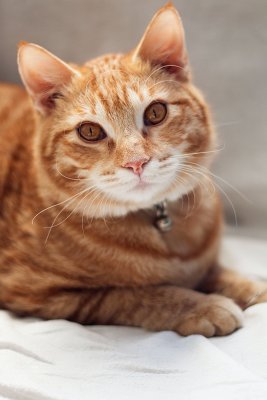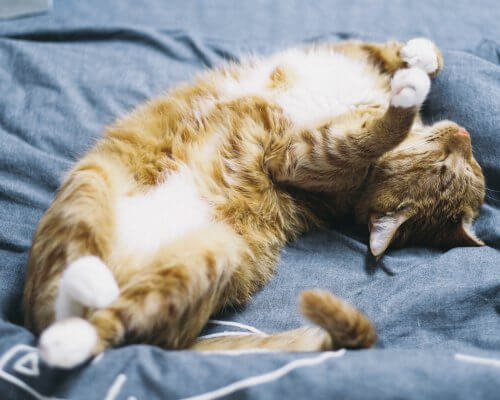Heavy breathing also knows as rapid breathing or panting. In heavy you find your cat difficult to inhale and breathe noisily and keep its mouth open. Breathing heavily is not a disease but a symptom that could be caused by hundreds of diseases. It may be because of Dehydration, Asthma, heart disease, lung disease or headstock, and many more.
Heavy breathing is common in many animals such as dogs, lions, and jaguars but cats are exceptions. Normally cats breathe rapidly after playing or doing any other kind of exercise such as scratching. Sometimes, you’ll find panting in healthy cats, it is something you should take it seriously and visit a vet.
Fat Cat breathing Heavily
The main reason for breathing heavily in fat cats is their obesity. Fat cats love to sleep every time, they don’t participate in any game that helps in losing weight. That’s why rapid breathing is more common in fat cats. According to a study by the APOP 59.5% of cats in the U.S. are classified as overweight.
But being overweight isn’t the only way for heavy breathing, there may be any other reason behind it. If you suspect rapid breathing without any activity, then you should visit a vet because heavy breathing can lead to several results.
What is Normal and Abnormal Breathing
First of all, you have to think about what your cat was doing before you noticed heavy breathing. Normally cats breathe rapidly after doing some exercise such as playing because they are overheated or anxious. If you noticed breathing rapidly after such reasons, so you don’t need to worry because it is Normal heavy breathing, and it can resolve itself after some rest. On the other hand, if your cat is not hot and tired from exercise and breathing rapidly then it is Abnormal breathing and a medical issue, you need to visit a vet.
Symptoms
Panting with an open mouth most common sign of a breathing issue. You’ll also feel that your cat is shaking and collapsing. In some cases, cats will try to hide. Breathing heavily in cats is dangerous and may lead to death. Usually, cats breathe through their nostrils but in heavy breathing, you’ll find your cat breathing with an open mouth. you may need to visit a vet immediately if you find the following symptoms in cats.
- Coughing
- Enlarged abdominal
- Foam coming out of the mouth
- Head low to the ground
- Lethargy
- Tachypnea
- Panting
- Rapid breathing
- Noisy breathing
Causes
It is not easy to find the right reason for breathing heavily in cats, only a veterinarian can make the proper diagnosis. In fat cats, it’s just obesity that causes breathing heavily, for exercise your cat needs cat toys that keep your buddy fit and active.
Dehydration and Asthma are the most common reason behind breathing heavily. Many Respiratory Infections and Allergies can also lead to it. Lung diseases like Pneumothorax (collapsed lung) and Pulmonary edema (excess of fluid in the lungs) also lead to breathing heavily. Stress, Pain, Fever, and Shock may also lead to breathing rapidly. There are many other reasons for breathing heavily in cats. Such as:

- Anemia
- Anxiety
- Airway obstruction
- Blood disorders
- Cancer
- Heart failure
- Heatstroke
- Heart disease
- Hyperthyroidism
- Lungworm
- Poison ingestion
- Pneumonia
- Pleural effusion
Diagnosis
First of all, you need to know when the breathing issues started and what was the symptoms you witnessed. Your cat’s veterinarian will carry out a careful actual assessment and assess your cat’s clinical history to track down the base of the issue. your veterinarian will direct oxygen before testing starts. Your cat’s general health will be determined by examining its ears, eyes, nose, and gums. Your cat’s lungs and chest will be listened to with a stethoscope to determine an abnormal heartbeat or if there is fluid in the lungs.
- Blood Tests
- ECG
- Fluid aspiration
- Rhinoscopy or Bronchoscopy
- Urine Sample
- X-rays and Ultrasound
Two simple ways can determine your cat’s breathing issue listening and watching your cat breathe.
Listening
The sound that your cat makes when they breathe can help localize the source of breathing difficulty. When your cat inhales or exhales vet will listen to determine whether its breathing is quiet or noisy. Wheezing is a continuous high-pitched whistling sound caused by lower airway obstruction. Stridor is a harsh noise that causes by a blockage in the windpipe. Stertor is sound-like nasal congestion caused by obstruction of the upper airway.
Watching
Visualizing your cat’s behavior helps your vet to determine its proper diagnosis. Heavy breathing on inhale is often a sign of an upper airway condition while exhaling distress is often indicative of lower airway disease. Cats with exhaling difficulty may show an abdominal push that is reflective of their effort to exhale. Paradoxical breathing (contract of the chest during inhalation and expands during exhalation) is another sign that may suggest other diseases.
Treatment
Treatment for cats with breathing problems will depend on the reason behind it. Treatment may be Antibiotics, bronchodilators, or other medications that help them breathe better. If the breathing problem is severe, the vet may give oxygen therapy. In many cases, medicines are proven to be enough for the recovery of your cat’s breathing problems. Heatstroke and Dehydration are easy to treat and recover fast. If stress and anxiety are causing breathing difficulties, you should find the reason for distress and treat it. Allergies can be treated with the best diet. If your cat suffers from a serious diagnosis like cancer, surgery may require.
With proper treatment and care for their condition, a cat with breathing problems can live a happy life. If you notice your cat is having to breathe heavily, take them to the vet so it can be treated in the best way. A cat with breathing issues can be treated in the following ways:
Asthma: Steroids and bronchodilators are proven to help with easy breathing.
Dehydration: Your cat will be given an IV to increase fluids to a normal level.
Fluid in lungs: Fluid may be aspirated to relieve your cat’s distress.
Foreign object: If you find out that a foreign object is obstructing the airway, a vet can remove it with surgical tweezers.
Heat stroke: In case of Heatstroke vet will lower the cat’s body temperature.
Respiratory infection: Antibiotics help to fight against the infection.
Tumors and cancer: Surgery may be required to remove the growth.


